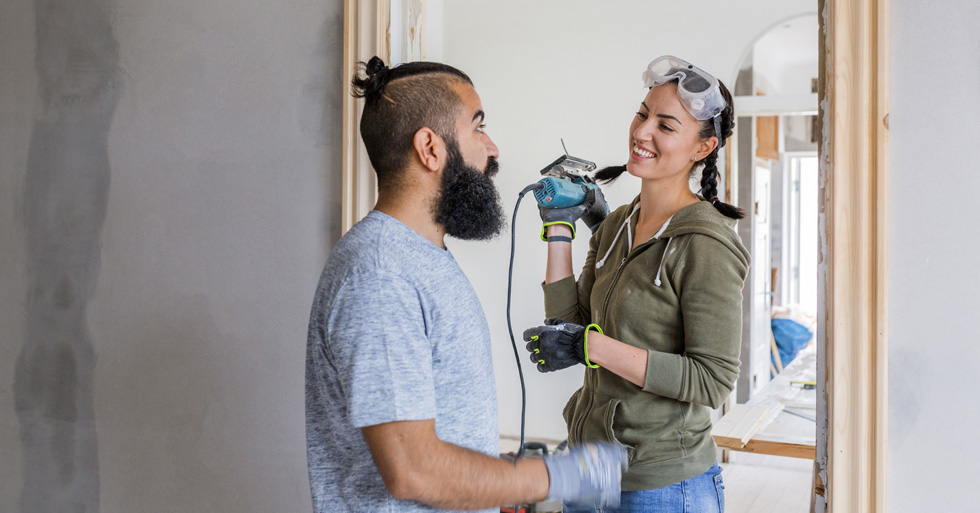Buying a home is one of the biggest investments you’ll make in your lifetime, and if you’re looking for a way to stretch your budget, a fixer upper might just be the answer. A fixer upper is typically a home in livable condition but in need of varying levels of repair or renovation. These homes usually come at a lower price point, making them appealing to buyers who are willing to put in some work to make the house their own.
A recent survey by StorageCafe found that fixer uppers cost about 29% less than move-in-ready homes, making them an attractive option for those looking to get into the real estate market without breaking the bank. But buying a home that requires some fixing up isn’t for everyone. Let’s explore what a fixer upper really is, why some buyers are drawn to this option, and what you should consider if you’re thinking of taking on a home renovation project.
What Is a Fixer Upper?
In simple terms, a fixer upper is a house that is ready to live in but may require improvements ranging from minor cosmetic updates, like replacing carpets or repainting walls, to more extensive renovations, such as installing a new roof, replacing outdated plumbing, or upgrading the electrical system. The level of work required varies greatly between homes, which makes it essential for prospective buyers to evaluate each property based on their comfort level, budget, and renovation skills.
Because fixer uppers need some degree of work, they are generally priced lower than homes that are move-in ready, aligning with their local market value. This price difference can be a major advantage for buyers looking to enter the market, especially in high-demand areas.
Why Consider a Fixer Upper?
The appeal of a fixer upper often goes beyond the financial savings. Here are some key reasons buyers choose to invest in homes that require a little extra care:
- Lower Entry Price: As previously mentioned, fixer uppers can be significantly cheaper than move-in-ready homes, potentially allowing buyers to buy into neighborhoods that might otherwise be out of reach.
- Room for Customization: A fixer upper gives you the chance to create a space that truly reflects your style and preferences. From kitchen cabinets to bathroom finishes, you have the freedom to make the home your own.
- Potential for Added Value: With smart improvements, a fixer upper can appreciate in value, especially if it’s in a desirable location. Investing in necessary repairs and upgrades can yield a solid return on investment over time.
- Less Competition: Not every buyer is willing to take on the challenge of a fixer upper. This can mean less competition for these properties, increasing your chances of closing on a house in a competitive market.
Tips for Buying a Fixer Upper
If you’re considering taking on a fixer upper, there are several essential steps to ensure you make a smart and informed decision. Here are some expert tips:
1. Choose a Good Location
One of the most critical factors in real estate is location. While you can change almost anything about a house, you can’t change where it is. Look for a fixer upper in a neighborhood with increasing property values, good schools, and amenities like parks, shopping centers, and restaurants. This way, even if you invest in renovations, your property is likely to appreciate over time.
2. Budget for Surprises
Renovating a fixer upper can be unpredictable, with unforeseen issues often popping up once work begins. Be prepared for costs you didn’t initially anticipate, like hidden water damage or outdated wiring that needs replacing. Make sure you build a cushion into your budget, ideally 10-20% of the renovation costs, to cover unexpected expenses.
3. Get a Home Inspection
A thorough home inspection is essential before purchasing a fixer upper. A licensed inspector will assess the property’s condition and point out any critical repairs that need attention. The inspection can reveal issues with plumbing, electrical, roofing, or foundation that might not be visible on the surface. This step is invaluable in helping you make an informed decision and understand the true scope of work required.
4. Plan Your Priorities
One of the best ways to approach a fixer upper is to categorize your renovation goals into three groups: essential repairs, desirable upgrades, and dream features.
- Must-Haves: These are the essential repairs necessary to make the house safe and livable. This category includes things like repairing structural damage, updating the electrical system, or replacing a leaky roof.
- Nice-to-Haves: These are upgrades that can make life easier or more enjoyable, such as adding a dishwasher or redoing the floors. They’re not essential but can add convenience and comfort to your home.
- Dream Features: These are the luxury upgrades you might want to add later, such as a home theater or a hot tub. Keeping these as future goals can help you prioritize your budget on the essentials first.
Working with a Real Estate Agent
Navigating the process of buying a fixer upper can be complicated, which is why working with a knowledgeable real estate agent can make a big difference. A skilled agent will understand the local market, helping you identify homes with good potential and value. They can also offer advice on negotiating prices and knowing what kind of renovations may add the most value to the property over time.
Benefits and Challenges of Owning a Fixer Upper
Like any major decision, buying a fixer upper comes with both benefits and challenges. Here’s a look at some of the pros and cons to consider:
Benefits
- Cost Savings: Lower initial purchase price can mean a more affordable entry into homeownership.
- Increased Value: With the right improvements, a fixer upper can increase significantly in value.
- Personalization: You can customize the home to your taste and lifestyle.
Challenges
- Unexpected Costs: Renovations can quickly go over budget if unexpected repairs are needed.
- Time Commitment: A fixer upper requires a commitment to the time and effort of managing renovations.
- Temporary Living Conditions: Depending on the scope of renovations, you may need to live with ongoing construction or make alternative living arrangements during major work.
Final Thoughts
Buying a fixer upper isn’t for everyone. It requires patience, planning, and a willingness to get hands-on with repairs and renovations. However, for those who are up to the challenge, the rewards can be significant. A fixer upper can provide an affordable entry into homeownership and allow you to create a personalized living space that aligns with your vision.
In today’s real estate market, where move-in-ready homes are often out of reach for many buyers, a fixer upper offers an alternative that combines affordability with potential for growth. By choosing a location wisely, budgeting carefully, and prioritizing your renovation goals, you can transform a house with untapped potential into a home that reflects your style and meets your needs.
So, is a fixer upper right for you? If you’re ready to roll up your sleeves and take on the challenge, it might just be the path to the home of your dreams. Whether you’re interested in a vintage charmer with character or a blank slate to design from scratch, a fixer upper could be the key to unlocking both a rewarding project and a beautiful, budget-friendly home.
Follow Hashtags: #HomeHunting #LosAngelesRealtor #QualityProperties #ShawnCollinsRealtor #HorizonRealEstate #RealEstate

 Shawn Collins
Shawn Collins 



